The Checker Maven
The World's Most Widely Read Checkers and Draughts Publication
Bob Newell, Editor-in-Chief
Published each Saturday morning in Honolulu, Hawai`i
Contests in Progress:
4th of July 2023
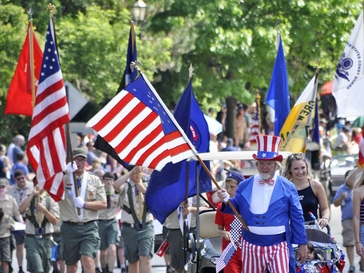
We never get tired of saying that we love the 4th of July, America's birthday. We are proud and unapologetic American patriots.[1]
For our 4th of July column, we always turn to an American checkerist. Often it's Tom Wiswell but today we'd like to feature another of America's all-time greats, Willie Ryan, with a game and problem from his aptly titled American Checkerist publication. Let's start with the run-up.
| 1. | 10-15 | 21-17 |
| 2. | 9-13 | 17-14 |
| 3. | 15-18 | ... |
Ryan calls this a probable loss but today we know that although perhaps not the best choice, it doesn't lose.
| 3 | ... | 22x15 |
| 4. | 11x18 | 24-19 |
Once thought to win, but only draws with correct play by Black.
| 5. | 8-11 | 28-24 |
| 6. | 6-9 | ... |
The losing move. Correct would have been 4-8 or 6-10. it's easy for Black to go wrong in this line.
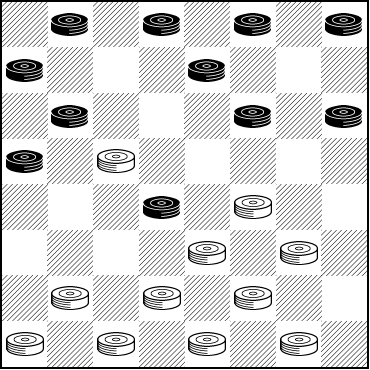
WHITE
White to Play and Win
W:W14,19,23,24,25,26,27,29,30,31,32:B1,2,3,4,5,7,9,11,12,13,18
The winning line is quite long, and not all that easy to discover. However, it's very instructive and this problem is well worth your time. See how far you can go, and then click on Read More to see the solution.
[1] Tragically, today to some the concept of patriotism is viewed as politically incorrect at best and racist at worst. We strongly disagree, and prefer the statement put forth by Gaines Foster of Louisiana State University: " ... you're an American because you believe in democracy, you believe in equality, you believe in opportunity."![]()
A Well-Rounded Gentleman
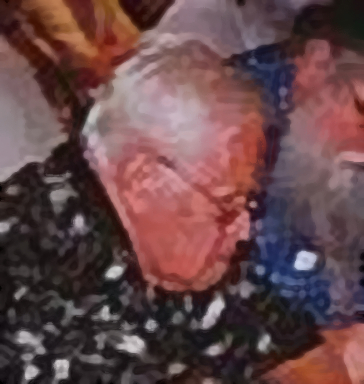
You may never have heard of him, but Theodore "Ted" Bullockus was one of those well-rounded fellows who was good at both checkers and chess. Mr. Bullockus was born on May 29, 1917; we don't have any further information about his life and career, although he apparently was born in the Bronx, where his Lithuanian parents lived. Mr. Bullockus passed away on October 11, 2008, in Sun City, California (now part of the Menofee retirement community).
We could only find one grainy photo of this gentleman, taken during a chess tournament some years back. But he must have been quite capable. We located this checker study of his, based on a Wood Mail Tourney game (players unknown). Here's the run-up.
| 1. | 9-14 | 22-17 |
| 2. | 5-9 | 17-13 |
| 3. | 1-5 | 24-19 |
| 4. | 11-16 | 28-24 |
| 5. | 16-20 | 32-28 |
| 6. | 8-11 | 19-16 |
| 7. | 12x19 | 24x8 |
| 8. | 4x11 | 23-19 |
| 9. | 11-15 | 19-16 |
| 10. | 15-18 | 16-12 |
| 11. | 10-15 | 26-23 |
26-22 would have drawn, but now Black has a win. Can you find it?
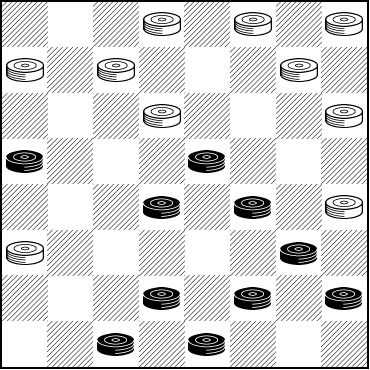
BLACK
Black to Play and Win
B:W12,13,21,23,25,27,28,29,30,31:B2,3,5,6,7,9,14,15,18,20
Match wits with Mr. Bullockus and see how you do. When you're ready, click on Read More to see the solution.![]()
Fix Me

It looks like some fixing is in order here. This could be among the worst home repair jobs possible. What a mess!
Some checker games need to be fixed, too, and "fixing" will be the point of today's Checker School column.
We came across a game played in the 1920 Pennsylvania State Championship Tournament which could, well, use some work. It's not that the players were unskilled. In fact, most of the game is well played. But there were three significant errors, all of which could have been fixed. Let's have a look.
Black: O. Zanger
White: H. B. Reynolds
| 1. | 10-14 | 23-19 |
| 2. | 6-10 | 22-17 |
| 3. | 9-13 | 27-23 |
| 4. | 13x22 | 25x9 |
| 5. | 5x14 | 29-25 |
| 6. | 11-15 | 25-22 |
| 7. | 8-11 | 32-27 |
| 8. | 4-8 | 22-17 |
| 9. | 2-6 | 17-13 |
WHITE
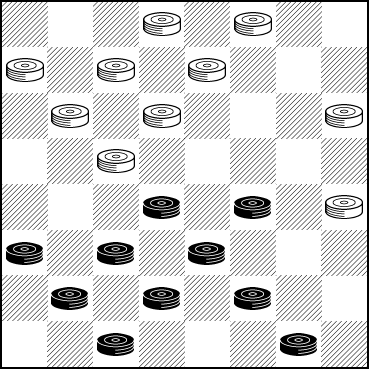
BLACK
Black to Play and Draw
B:W13,19,21,23,24,26,27,28,30,31:B1,3,6,7,8,10,11,12,14,15
| 10. | 14-17 | ... |
This moves loses. In Diagram 1 above, fix me!
| 10. | ... | 21x14 |
| 11. | 10x17 | 19x10 |
| 12. | 7x14 | ... |
BLACK
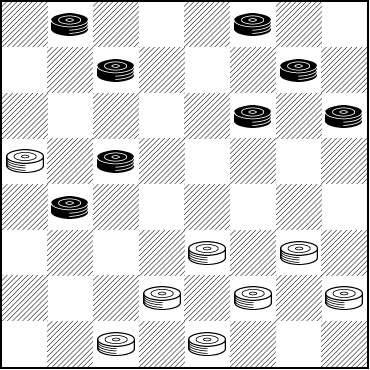
WHITE
White to Play and Win
W:W13,23,24,26,27,28,30,31:B1,3,6,8,11,12,14,17
| 12. | ... | 24-20 |
This move gives up the win and only draws. In Diagram 2 above, fix me!
WHITE
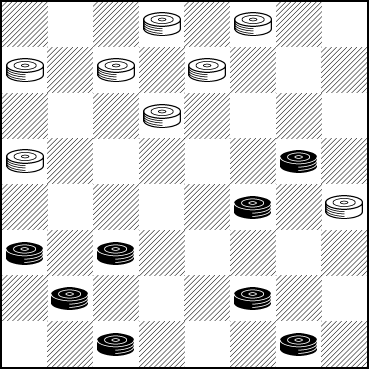
BLACK
Black to Play and Draw
B:W13,20,23,26,27,28,30,31:B1,3,6,8,11,12,14,17
| 13. | 3-7 | ... |
This move loses. In Diagram 3 above, fix me!
| 13. | ... | 23-19 |
| 14. | 17-21 | 27-23 |
| 15. | 14-17 | 23-18 |
| 16. | 6-10 | 26-22 |
| 17. | 17x26 | 31x22 |
| 18. | 1-5 | ... |
The players left the game here as a White win.
| 18. | ... | 22-17 |
The White win is clear. Black is going to have to give up a lot of men.
Can you "fix" the three unfortunate moves above? Resolving actual over-the-board situations such as these is a great way to improve your own play. Don't fixate on this; just do the best you can, and then fix your mouse on Read More to see the correct moves.
And stay safe and well, checker fans, wherever you are.![]()
Happy Holidays 2019
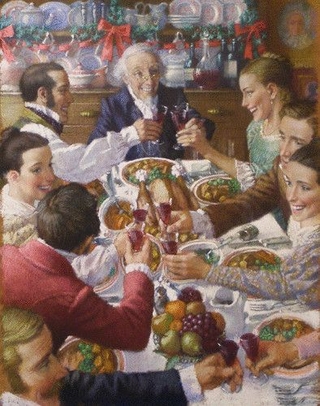
The holiday season is in full swing and we extend greetings and best wishes to all of our readers. No matter which holiday you celebrate, may you find happiness and blessing.
We thought we'd present a little longer study this week. Perhaps you'll have some extra spare time over the holidays (or perhaps not!), but in any case it's a good one. The problem situation is based on a game contested in Markham, Ontario, on April 15, 1889. The players were checkerists Fleming and Wright, and the game and variations appeared in a relatively short-lived periodical called The Chicago Evening Lamp.
| 1. | 11-15 | 23-19 |
| 2. | 8-11 | 22-17 |
| 3. | 9-14 | 25-22 |
| 4. | 11-16 | 24-20 |
| 5. | 16x23 | 27x11 |
| 6. | 7x16 | 20x11 |
| 7. | 3-7 | 28-24 |
| 8. | 7x16 | 24-20 |
| 9. | 16-19 | 29-25 |
| 10. | 4-8 | 22-18 |
| 11. | 14x23 | 17-14 |
| 12. | 10x17 | 21x14 |
Perfectly played thus far, and we've reached the end of the KingsRow opening book for the game as actually played.
| 13. | 8-11 | 31-27 |
| 14. | 19-24 | 27x18 |
| 15. | 12-16 | 32-28 |
This seemingly natural move actually loses. 25-22 would have been correct to draw.
| 16. | 24-27 | 28-24 |
| 17. | 27-31 | 25-22 |
| 18. | 31-27 | 24-19 |
| 19. | 16x23 | 26x19 |
Here the Lamp called the game a draw and showed a drawing line. But it's actually a Black win.
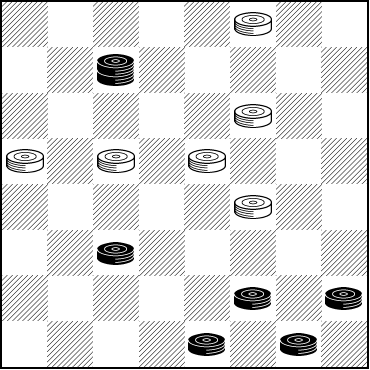
BLACK
Black to Play and Win
B:W14,18,19,20,22,30:B1,2,5,6,11,K27
Can you do better than the Lamp did, over 130 years ago? Shed some light on this interesting position, and then click on Read More to illuminate the solution and notes.![]()
Season Opener

It was Opening Day for the National Checker League as the 2019-2020 season was about to begin, and Marvin J. Mavin, Captain of the defending champion Detroit Doublejumpers, was ready.

Marvin J. Mavin
August training camp had been rough, with lots of physical and mental training. But Marvin had to admit it felt good to be in top shape, even though he thought the coaches had been pretty tough on him. No beer for a whole month, and running laps constantly.

This afternoon, the Doublejumpers were facing the Seattle Single Corners at Starbugs Stadium in Seattle. A sellout crowd of over 50,000 was on hand to see what promised to be an exciting contest.

Marvin, on first board, was paired up against the Seattle captain, a short, squat fellow that just went by the name Sluggo. In high school and college, Sluggo was a champion weight lifter and wrestler, but he was so good at checkers that he decided to take a pro contract. Still, one look at him told you that he had definitely kept up the physical training.
Word had gotten around the League about Marvin's experiences in training camp this year, and Sluggo started to ride Marvin as soon as they took their places across the checkerboard.
"Heard you had to run some laps," Sluggo said. "Must a been tough for a wimp like you." Sluggo laughed, a deep, nasty sound that had intimidated many an opponent both over the board and in the ring.
"Yeah, well, unlike you I got a brain," Marvin said.
"Not very original," Sluggo replied, "and anyhow you won't have one yourself after I bust up your head."
"Hey! Are you threatening me? You can't do that!"
Sluggo looked Marvin right in the eye. "Really? Whatcha gonna do about it?" Sluggo raised his clenched fists to chest level.
Marvin involuntarily took a step back, but just then the referee's whistle blew and the call "Play checkers!" resounded across the field.

Sluggo stuck out his hand for a handshake, but Marvin didn't take it. He was afraid Sluggo would break his fingers. That got another low laugh from Sluggo. "Have it your way, little boy," he said. "I'll beat you on the board, over the board, and into the board."
The game proceeded as follows. Marvin had Black and Sluggo had White.
| 1. | 11-16 | 23-18 |
| 2. | 10-15 | 18x11 |
| 3. | 8x15 | 24-19 |
| 4. | 15x24 | 27x11 |
| 5. | 7x16 | 28-24 |
| 6. | 4-8 | 22-18 |
| 7. | 8-11 | 26-23 |
| 8. | 16-20 | 31-27 |
| 9. | 6-10 | 18-14 |
| 10. | 10x17 | 21x14 |
| 11. | 9x18 | 23x14 |
| 12. | 11-15 | 30-26 |
| 13. | 3-7 | 26-23 |
| 14. | 1-6 | 25-21 |
Loses. 25-22 was correct.
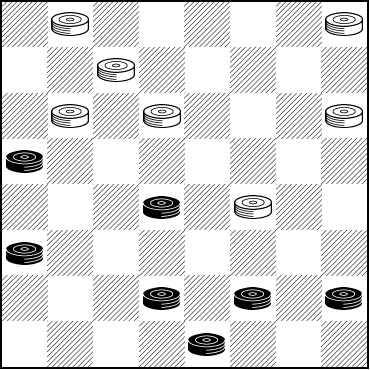
BLACK
Black to Play and Win
B:W14,21,23,24,27,29,32:B2,5,6,7,12,15,20
Marvin chuckled. "Hey, you did pretty well up to now--- for a lamebrain. But that last move is gonna cost you the game."
"Oh yeah?" replied Sluggo. "Sez who?"
"Sez me, Marvin J. Mavin."
"You're dead meat. Nobody beats Sluggo."
Marvin chuckled again. "We'll see about that," he said, and made his move.
Can you beat Sluggo? No, not on a wrestling mat, but over the board? See if you can find the win and then slam your mouse on Read More to see the solution and the conclusion of our story.![]()
Marvin's Summer Vacation

Marvin J. Mavin, Captain of the Detroit Doublejumpers, a highly ranked team in the National Checker League, was on summer vacation. The League wrapped up the World Series of Checkers in May, and players were off until training camp started up at the beginning of August.
Ten weeks of vacation. He'd spend some of it with his girlfriend Priscilla, although she could only get away from her corporate executive job for a week at a time, and only now and then. He'd spend four weeks doing outreach work in the inner cities. And he'd spend three blessed weeks at a lake cabin, kicking back and thinking of little else but when to pop open his next beer. No cell phone. And definitely no checker board.
Except it didn't work out exactly like that.

Marvin booked a cabin in Idaho under the name of John Smith. He thought that was pretty clever. Of course, he was a national sports figure and pretty easy to recognize, but he always looked for a cabin that was out of the way and isolated, and then he stuck pretty much to himself, arranging to have the refrigerator well stocked before his arrival, so that he could just hang around the cabin, walk down to the lake, and not be bothered by anything or anyone.
It must have been on the third or fourth day when he saw a familiar looking figure walking further down the lakeshore. Now, Marvin's cabin was indeed well separated from the others, so it was pretty far, but the figure was quite unmistakable. Marvin just hoped he hadn't been noticed, and he was pretty careful to check each time he went to the lake thereafter.
Two evenings later, Marvin had just finished with dinner --- he had plenty of microwave meals in the cabin's freezer --- he was about to open another beer when there was a knock at the cabin door.
Marvin was pretty surprised. Could it be the camp manager? No one else was supposed to bother him. He got up, opened the door, and saw ---
Dmitri.
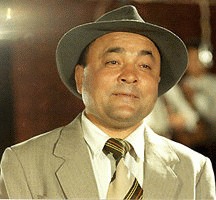
Dmitri
Yes indeed, Dmitri Tovarischky. The guy he had seen further down the lakeshore. The guy who was his archenemy, a former Soviet champion who was asked to leave the National Checker League over a gambling violation, and who now stalked the star players.
"Ah, Checkers Boy. I see you other day by lake. How conwenient we are staying in same campsite," Dmitri said. "Maybe coincidence, maybe not, eh? I come in now, da?"
Dmitri entered before Marvin could reply.
Marvin made a mental note to later find out who leaked his vacation plans.
"We play one game, da?" he said. "Play maybe for wodka. I win, you give me couple bottles Stolichnaya. You win, I give you same thing, only you don't win, this I know already."

"I ain't got no 'wodka,' Pinko. Never touch the stuff. Now leave and don't come back."
"Ah, Checkers Boy should not be rude. I have little set here, I put on table." Boris quickly got out a portable checker set and made it ready. Marvin could tell it was going to be hard getting rid of him. "Maybe play for hundred bucks?"
So that was what it was all about. Dmitri was an inveterate hustler. Marvin replied, "Okay. One game. A hundred bucks to the winner. Nothing on a draw. But no matter what you get lost permanently."
"Easy money for me," Dmitri said. "Deal."
The two of them sat down and the game began. Outside, the sun was setting over the lake and the air was cooling. It was a beautiful Idaho evening but neither of them noticed.

Dmitri played Black and Marvin had White.
| 1. | 11-15 | 23-19 |
| 2. | 8-11 | 22-17 |
| 3. | 4-8 | 26-22 |
| 4. | 9-13 | ... |
26-22 was weaker than 25-22. Perhaps Marvin was throwing Dmitri a bit of a curve ball? But Dmitri missed the opportunity to reply with 15-18.
| 4. | ... | 27-23 |
| 5. | 5-9 | 23-18 |
| 6. | 10-14 | 17x10 |
| 7. | 7x23 | 19x10 |
| 8. | 6x15 | 31-26 |
| 9. | 23-27 | 32x23 |
| 10. | 2-7 | 23-18 |
"Hoo, Checkers Boy, you are making stupid move. Why you not play 23-19? Now Dmitri have big winning game!"
| 11. | 7-10 | ... |
"Dmitri can even win by playing of 12-16. So many ways to win, so nice, da?"
Marvin, for his part, was starting to sweat. How could he have made such a blunder?
| 11. | ... | 21-17 |
| 12. | 1-5 | ... |
"Uh, hey there Commie, I think you blew it. You even mentioned 12-16 your own self, why didn't ya play it?" Marvin said.
"I am still going to win, Checkers Boy, do not worry yourself." But Dmitri sounded a bit less confident.
| 12. | ... | 25-21 |
| 13. | 9-14 | 18x9 |
| 14. | 5x14 | 26-23 |
| 15. | 11-16 | 30-25 |
| 16. | 16-19 | ... |
At this, Marvin started to laugh. "Nice try, get an early king, that's what you think? You shoulda played 8-11, pal. Now you lose."
| 16. | ... | 23x16 |
| 17. | 12x19 | ... |
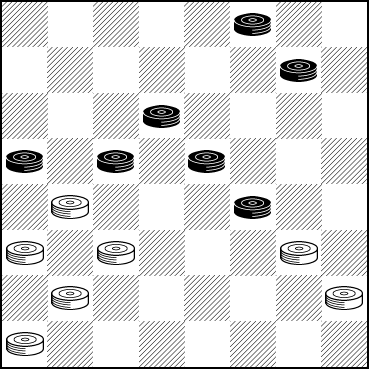
WHITE
White to Play and Win
W:W17,21,22,24,25,28,29:B3,8,10,13,14,15,19.
Does Marvin now have a win on the board? Did Dmitri make a huge blunder in his own right? Study the position and see if you can find the winning moves. This one actually falls on the easy side. When you're ready, click on Read More to see the solution and the conclusion of our story.![]()
Three Wrongs, One Right
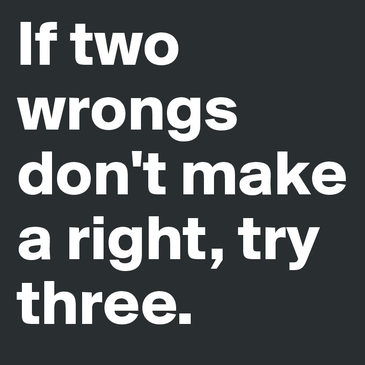
Two wrongs don't make a right, we're told, and if so, surely three wrongs don't, either. A third wrong will only lead to even more trouble--- or in the case of our game of checkers, a loss--- and that leads us to this week's four-fold problem.
We'll look at a published game from years back, in which three wrongs weren't counterbalanced by a right (until today, at least).
| 1. | 11-15 | 22-18 |
| 2. | 15x22 | 25x18 |
| 3. | 12-16 | 29-25 |
| 4. | 10-14 | 24-19 |
| 5. | 8-12 | 26-22 |
| 6. | 4-8 | 18-15 |
| 7. | 16-20 |
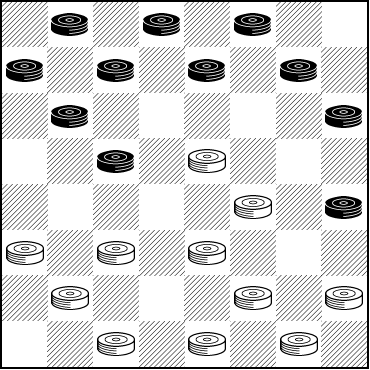
WHITE
White to Play and Draw
W:W15,19,21,22,23,25,27,28,30,31,32:B1,2,3,5,6,7,8,9,12,14,20.
At this juncture, White played 23-18, and annotator Gary Garwood called it a weak move. He suggested instead 31-26 or 22-18. But these moves are just as bad. All three of them lose. Three wrongs, no right. But in fact there is a right move and White can obtain a draw here.
Can you find the correct move to draw for White, and then (for extra credit, if you will) show the Black wins for all three incorrect moves? It's a tall assignment, but one that will give you quite a bit of checker insight.
When you're right (and you know it, as the saying goes) do the right thing by clicking your mouse on Read More to see the solutions.![]()
Taking On The Champ, Part 2
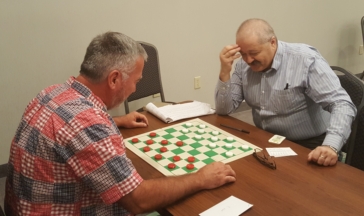
Last month we presented the first game of Watson's exciting match against Alex Moiseyev, which ended in a draw. This month we'll look at the second game of the round. Will Alex come roaring back?
Watson says: "This game I took the white. I actually like the white side in this opening. We began the game. No unexpected moves. Again, I felt good about the game."
| 1. | 11-15 | 24-19 |
| 2. | 15x24 | 28x19 |
| 3. | 8-11 | 22-18 |
| 4. | 10-14 | 25-22 |
| 5. | 11-16 | 29-25 |
22-17 or 27-24 should be played here instead.
| 6. | 6-10 |
Loses the advantage; 16-20 would have retained it.
| 6. | ... | 27-24 |
Watson thinks this is a key moment: " ... the turning point in this game came at move 12 (27-24). This set up was what my Dad used to play all the time against me. He liked it. I never thought much about it. However, when this move came up, I was thinking my Dad was watching. I could almost hear him saying, 'Move there, Watty.'"
| 7. | 1-6 | 31-27 |
32-28 is considerably better.
| 8. | 16-20 |
7-11 was better. The game is now back in the KingsRow opening book.
| 8. | ... | 32-28 |
| 9. | 4-8 | 19-15 |
Watson now thinks the game is decided: "The next move to change the game in my opinion was 19-15 exchange. To me, this was the winning move. He never recovered."
| 10. | 10x19 | 24x15 |
| 11. | 9-13 | 18x9 |
| 12. | 5x14 | 22-18 |
| 13. | 6-9 | 15-10 |
| 14. | 8-11 |
May lose; 12-16 was correct. But let's let Watson describe what happened:
"The next key move, in my opinion, was 15-10 ... By this time, Alex was in serious trouble ... I did not see a single good move for Alex. I saw my win. I was happy. I think Alex saw no way out.
| 14. | ... | 28-24 |
| 15. | 11-16 |
11-15 was a little better.
| 15. | ... | 24-19 |
"I do not know why, but it seemed like someone was nudging me. The voice was saying 'offer the draw.' I was thinking the game is almost over. I have it ... But I kept thinking I needed to offer (the) draw. I cannot fully explain why I offered the draw except to say at that point, I was very happy to get a draw against the World Champion. I knew three things. It had been a long day and I was tired. I knew that Frank and Mary (the hosts) had been very patiently waiting for us to finish. I knew I had a 700 mile trip ahead of me that day ... So I said to Alex, 'Would you like the draw?' Alex looked up at me, surprised. Alex could see it was over. He smiled and said, 'Yes, I would. Thank you.' We shook hands and that was it. It was a very good feeling for me."
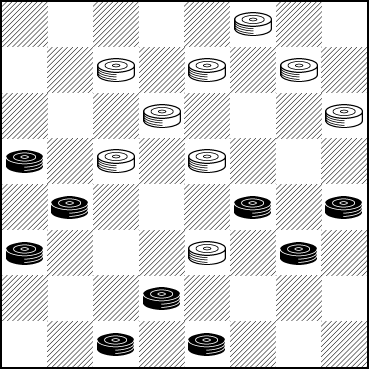
BLACK
Black to Play; What Result?
B:W30,27,26,25,23,21,19,18,10:B20,16,14,13,12,9,7,3,2.
What do you think? Should Watson have taken the draw, or is there a White win? What is Black's best continuation? Is there a way for White to go wrong and allow a Black win?
Take on both Watson and Alex and see what you can come up with, then click on Read More to see what might have happened had the game gone on. And be sure to read Watson's full story here.![]()
Taking On The Champ, Part 1

Suppose you're a Master level checker player. You're at a tournament and suddenly you find yourself matched with someone who held the World Championship for many years. An intimidating prospect? Certainly you're good, but this guy is good.
Now, imagine instead that you're in the Minor category? You're still in all likelihood a pretty good player, but ... two games against Alex Moiseyev?
Would your instinct be to make a hasty exit from the tournament room, maybe even to catch the next flight to some remote location? Or would you stick it out, expecting to take your lumps and just hope you don't look too bad?
This was almost exactly the prospect faced by Watson Franks, who told us a story of courage and accomplishment from which we can all learn something. Watson didn't run; he sat down and played.
Watson sent us a very interesting and detailed account of his adventure, and while we can't run it all in our weekly columns, we'll put it online in its entirety at the conclusion of this two-part series.
How did this all come about? Watson tells us:
"This past October, 2016, my wife encouraged me to go to the Alabama State Tournament ... at the beginning of the tournament ... they decided they wanted to do a Round Robin ... The Master Players realized that in order to have a Round Robin Tournament, they would need to have eight players ... they only had seven signed up ... I volunteered to move up ... They were appreciative ... very few thought I would get a draw, much less a win against any of the master players."
But Watson did quite well in the early rounds, surprising everyone with his results, including, we believe, himself: he racked up six draws and six losses against six different Master players. (If you don't think that's fantastic, try getting even one draw against one of these champs.)
In the final round, though, he was inevitably matched with Alex Moiseyev. Did he panic?
Here's a little of Watson's narrative:
"Everyone knew I would play Alex the final round. I remember, one of the contestants told me in joking, 'If you were to beat Alex, that would be more of an upset than Trump beating Clinton.' I told him, 'Strange things can happen ... on any given checker board.'
"Alex and I sat on the far side of the room. There was no one around us. It was very quiet. Alex shuffled the 3-move opening cards. In my mind, I knew it would be a good opening. By good opening, I mean one that I was very familiar with. Sure enough, the opening was 11-15, 24-19, 15-24. A 'Go As You Please' opening!"
In the first game, Watson had Black and Alex had White.
| 1. | 11-15 | 24-19 |
| 2. | 15x24 | 28x19 |
| 3. | 8-11 | 22-18 |
| 4. | 9-14 | 18x9 |
| 5. | 5x14 | 26-22 |
| 6. | 11-15 | 22-18 |
| 7. | 15x24 | 18x9 |
| 8. | 6x13 | 27x20 |
| 9. | 4-8 | 25-22 |
| 10. | 8-11 | 30-26 |
| 11. | 2-6 | 31-27 |
End of KingsRow opening book.
| 12. | 11-15 | 23-18 |
May lose; 20-16 was correct.
| 13. | 15-19 | 18-14 |
| 14. | 10x17 | 21x14 |
| 15. | 19-24 | |
Gives away the advantage; 6-10 might likely win.
| 15. | ... | 27-23 |
| 16. | 24-27 | 20-16 |
14-9 would have been a sure draw.
| 17. | 12x19 | 23x16 |
The game was left here as a draw. Watson tells us:
"The game reached a turning point. I thought I had (a) decent position. I was pleased with my shape. I knew what my next move would be. It looked very good for me. He (Alex) looked at me and said, 'Would you like a draw?' I looked at the board for a bit. I said to him, 'If you think this is a draw, then itís a draw. But I think I have very good shape.' He said, 'It looks drawish.' Of course, I could have kept playing if I had wanted to do so. It was my choice to accept (the) draw. I could have made a bad move and lost the game. But at the point of draw, I realize now that I had (a) winning position. I was very proud of that game."
So what do you think? Could Watson have won the game? What about his fear of possibly making a poor move and losing?
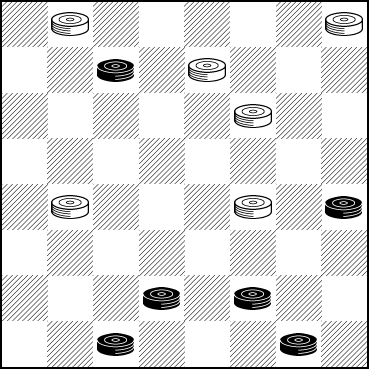
BLACK
Black to Play, What Result?
B:W32,29,26,22,16,14:B27,13,7,6,3,1.
Study the position, and when you're done, click on Read More for the answer to these intriguing questions.![]()
Richard Pask At Home

Grandmaster Pask in his Library
At the end of May of this year (2017) your editor had the great pleasure of visiting with Mr. Richard Pask and family at his home in the town of Chickerell, in Weymouth, on England's southern coast. Mr. and Mrs. Pask, and their son Robert, are delightful and hospitable people, and it was a very memorable visit indeed.

Mrs. Pask's English Garden
Mrs. Pask, a musician and teacher, is also a talented gardener and keeps a wonderful English garden, the likes of which are seen only in movies.
Of course, we talked checkers, and Mr. Pask showed us through his library (shown above), packed with checker literature and checker memorablia. Our discussions ranged far and wide, continuing over dinner at a traditional English pub, The Turk's Head.

Mrs. Pask, your Editor, and Mr. Pask
We asked Mr. Pask to tell us of his favorite personal game, and he said it came from the 1985 Scottish Open, where Mr. Pask had the White against Danny Shields with the Black.
| 1. | 10-14 | 24-19 |
| 2. | 7-10 | 27-24 |
| 3. | 9-13 |
A likely loss (already)! 11-15 or 11-16 would have been correct. Mr. Pask points out that this position can also arise from the opening sequence 1. 9-13 23-19; 2. 10-14 27-23; 3. 7-10?.
| 3. | ... | 22-18 |
| 4. | 11-15 | 18x11 |
| 5. | 8x15 | 24-20 |
26-22 instead keeps the advantage.
| 6. | 15x24 | 28x19 |
The game has now reverted to a probable draw, although the actual play could be difficult over the board.
| 7. | 4-8 | 25-22 |
| 8. | 2-7 |
Probably loses. 8-11 would be a narrow draw.
| 8. | ... | 22-18 |
| 9. | 14-17 | 21x14 |
| 10. | 10x17 | 18-15 |
| 11. | 5-9 | 29-25 |
| 12. | 6-10 |
9-14 was better; Black is surely lost.
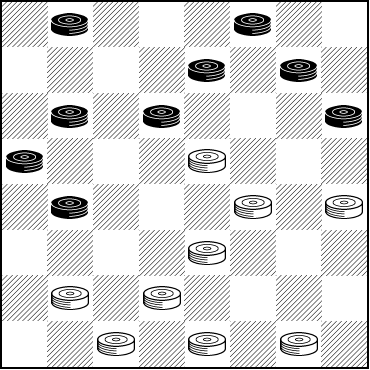
WHITE
White to Play and Win
W:W32,31,30,26,25,23,20,19,15:B17,13,12,10,9,8,7,3,1.
Grandmaster Pask was able to find the win in this position. Can you? We'd rate this one as about medium in difficulty; a little effort will be rewarded. See how you do and then click on Read More to see the solution.![]()
The Checker Maven is produced at editorial offices in Honolulu, Hawai`i, as a completely non-commercial public service from which no profit is obtained or sought. Original material is Copyright © 2004-2024 Avi Gobbler Publishing. Other material is the property of the respective owners. Information presented on this site is offered as-is, at no cost, and bears no express or implied warranty as to accuracy or usability. You agree that you use such information entirely at your own risk. No liabilities of any kind under any legal theory whatsoever are accepted. The Checker Maven is dedicated to the memory of Mr. Bob Newell, Sr.

